The most up-to-date and complete list of publications is available at Google Scholar: https://scholar.google.com/citations?user=mul7cXgAAAAJ.
-
Equilibrium Densities of Intrinsic Defects in Transition Metal Diselenides of Molybdenum and Tungsten.
L. Holtzman, P. Vargas, R. G. Hennig, and K. Barmak, J. Chem. Phys., in print (2024). -
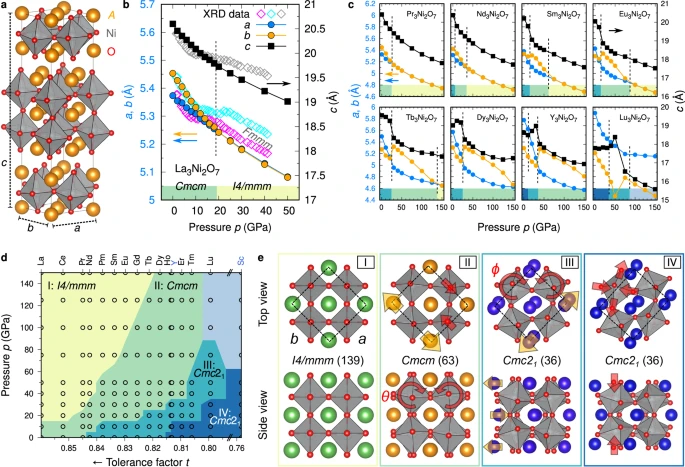 Structural transitions, octahedral rotations, and electronic properties of A3Ni2O7 rare-earth nickelates under high pressure.
Structural transitions, octahedral rotations, and electronic properties of A3Ni2O7 rare-earth nickelates under high pressure.
B. Geisler, J. J. Hamlin, G. R. Stewart, R. G. Hennig, and P. J. Hirschfeld, npj Quantum Materials 9, 38 (2024), [doi:10.1038/s41535-024-00648-0]. -
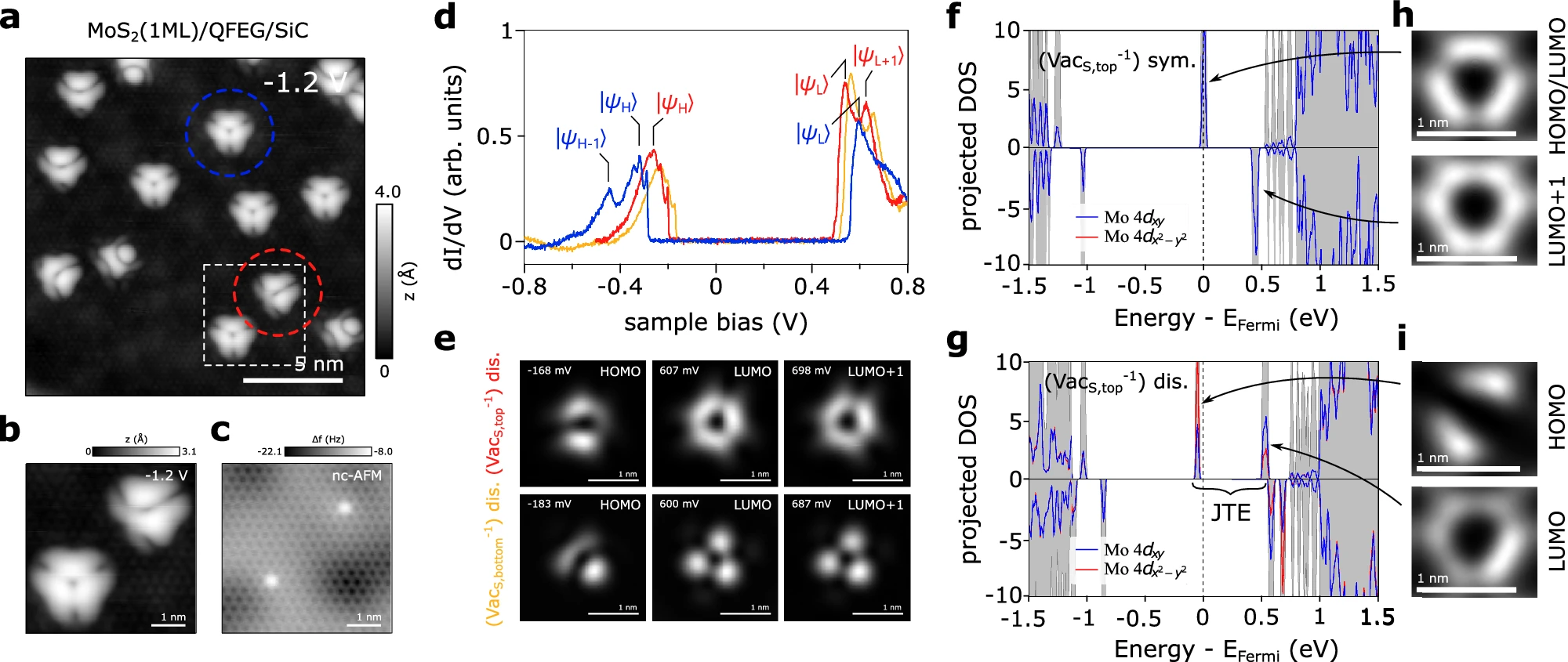 Charge state-dependent symmetry breaking of atomic defects in transition metal dichalcogenides.
Charge state-dependent symmetry breaking of atomic defects in transition metal dichalcogenides.
F. Xiang, L. Huberich, P. A. Vargas, R. Torsi, J. Allerbeck, A. M. Z. Tan, C. Dong, P. Ruffieux, R. Fasel, O. Gröning, Y.-C. Lin, R. G. Hennig, J. A. Robinson, and B. Schuler, Nature Communications 15, 2738 (2024), [doi:10.1038/s41467-024-47039-4]. -
Stability of the Ternary τ11-Al4Fe1.7Si Intermetallic Phase from Experiment and Ab Initio Calculations.
S. Soto-Medina, B.Rijal, Y. Yang, L. Zhu, A. K. Sachdev, R. G. Hennig, and M. V. Manuel, J. Alloys Compd. 978, 173207 (2024), [doi:10.1016/j.jallcom.2023.173207]. -
Diboride compounds doped with transition metals: A route to superconductivity through structure stabilization as well as defects.
P. M. Dee, J. S. Kim, A. C. Hire, J. Lim, L. Fanfarillo, S. Sinha, J. J. Hamlin, R. G. Hennig, P. J. Hirschfeld, G. R. Stewart, Phys. Rev. B 109, 104520 (2024), [doi:10.1103/PhysRevB.109.104520]. -
High temperature lightweight Al-Fe-Si based alloys.
S. S. Medina, M. V. Manuel, R. G. Hennig, L. Zhu, B. Rijal, US Patent 11,840,746, [https://patents.google.com/patent/US11840746B2]. -
Augmenting the discovery of computationally complex ceramics for extreme environments with machine learning.
S. Bavdekar, R. G. Hennig, and G. Subhash, J. Mater. Res. (2023), [doi:10.1557/s43578-023-01217-0]. -
Transition Temperature for Spin-Crossover Materials with the Mean Value Ensemble Hubbard-U Correction.
A. Albavera-Mata, R. G. Hennig, and S. B. Trickey, J. Phys. Chem. A 127, 7646 (2023), [doi:10.1021/acs.jpca.3c03520]. -
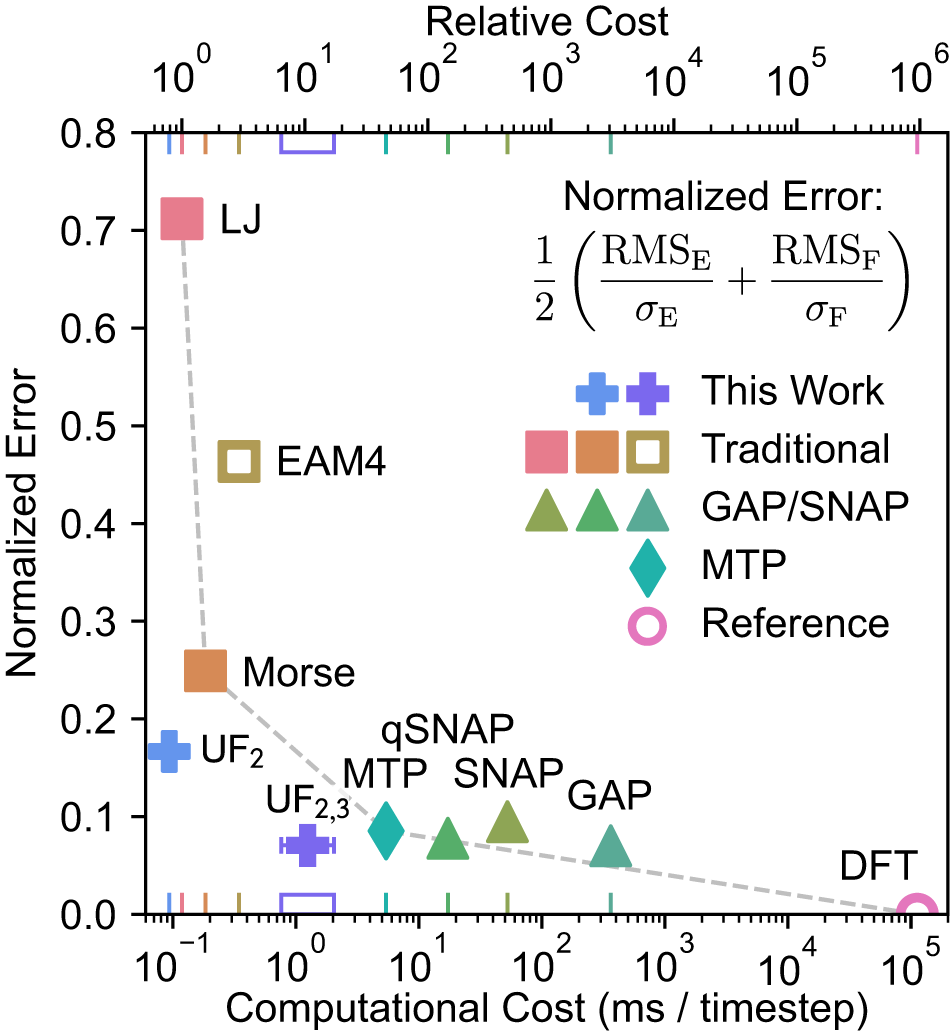 Ultra-fast interpretable machine-learning potentials.
Ultra-fast interpretable machine-learning potentials.
S. R. Xie, M. Rupp an R. G. Hennig, npj Computational Materials 9, 162 (2023), [doi:10.1038/s41524-023-01092-7]. -
Niobium substitution suppresses the superconducting critical temperature of pressurized MoB2.
J. Lim, S. Sinha, A. C. Hire, J. S. Kim, P. M. Dee, R. S. Kumar, D. Popov, R. J. Hemley, R. G. Hennig, P. J. Hirschfeld, G. R. Stewart, and J. J. Hamlin, Phys. Rev. B 108, 094501 (2023), [doi:10.1103/PhysRevB.108.094501]. -
Fabrication and low-temperature characterization of phthalocyanine molecular tunnel heterojunctions.
X. Jiang, A. Brook. S. Liu, J. Koptur-Palenchar, Y. Quan, R. G. Hennig, H.-P. Cheng, X. G. Zhang, and A. Hebard, J. Phys. Chem. C 127, 17473 (2023), [doi:10.1021/acs.jpcc.3c02623]. -
Enhanced Surface Superconductivity of Niobium by Zirconium Doping.
N. S. Sitaraman, Z. Sun, B. L. Francis, A. C. Hire, T. Oseroff, Z. Baraissov, T. A. Arias, R. G. Hennig, M. U. Liepe, D. A. Muller, and M. K. Transtrum, Phys. Rev. Applied 20, 014064 (2023), [doi:10.1103/PhysRevApplied.20.014064]. -
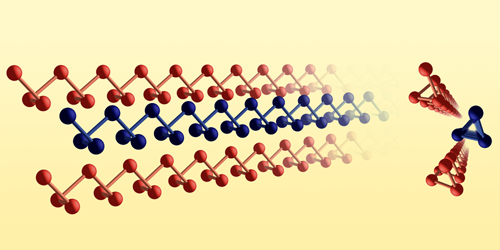 Stability and magnetic behavior of exfoliable nanowire one-dimensional materials.
Stability and magnetic behavior of exfoliable nanowire one-dimensional materials.
J. T. Paul, J. Lu, S. Shah, S. R. Xie, and R. G. Hennig, Small, Phys. Rev. Materials 7, 076002 (2023), featured in Physics 16, s104 (2023) (link),
[doi:10.1103/PhysRevMaterials.7.076002]. -
ZrNb(CO) RF Superconducting Thin Film with High Critical Temperature in the Theoretical Limit.
Z. Sun, T. Oseroff, Z. Baraissov, D. K. Dare, K. Howard, B. Francis, A. C. Hire, N. Sitaraman, T. A. Arias, M. K. Transtrum, R. G. Hennig, M. O. Thompson, D. A. Muller, M. U. Liepe, Advanced Electronic Materials9, 2300151 (2023), [doi:10.1002/aelm.202300151]. -
Tailoring the Angular Mismatch in MoS2 Homobilayers through Deformation Fields.
K. Burns, A. M. Z. Tan, J. A. Hachtel, A. Aditya, N. Baradwaj, A. Mishra, T. Linker, A. Nakano, R. Kalia, E. J. Lang, R. Schoell, R. G. Hennig, K. Hattar, and A. Aitkaliyeva, Small 19, 2300098 (2023), [doi:10.1002/smll.202300098]. -
 Submonolayer and Monolayer Sn Adsorption and Diffusion Behavior on Oxidized Nb(100).
Submonolayer and Monolayer Sn Adsorption and Diffusion Behavior on Oxidized Nb(100).
S. A. Willson, R. G. Farber, A. C. Hire, R. G. Hennig, and S. J. Sibener, J. Phys. Chem. C 127, 3339 (2023), [doi:10.1021/acs.jpcc.2c08458]. -
Creating superconductivity in WB2 through pressure-induced metastable planar defects.
J. Lim, A. C. Hire, Y. Quan, J. S. Kim, S. R. Xie, S. Sinha, R. S. Kumar, D. Popov, C. Park, R. J. Hemley, Y. K. Vohra, J. J. Hamlin, R. G. Hennig, P. J. Hirschfeld, and G. R. Stewart, Nature Communications 13, 7901 (2022), [doi:10.1038/s41467-022-35191-8]. -
 Mean Value Ensemble Hubbard-U Correction for Spin-Crossover Molecules.
Mean Value Ensemble Hubbard-U Correction for Spin-Crossover Molecules.
A. Albavera-Mata, S. B. Trickey, and R. G. Hennig, J. Phys. Chem. Lett. 13, 12049 (2022), [doi:10.1021/acs.jpclett.2c03388]. - High critical field superconductivity at ambient pressure in MoB2 stabilized in the P6/mmm structure via Nb substitution.
A. C. Hire, S. Sinha, J. Lim, J. S. Kim, P. M. Dee, L. Fanfarillo, J. J. Hamlin, R. G. Hennig, P. J. Hirschfeld, and G. R. Stewart, Phys. Rev. B 106, 174515 (2022), [doi:10.1103/PhysRevB.106.174515]. 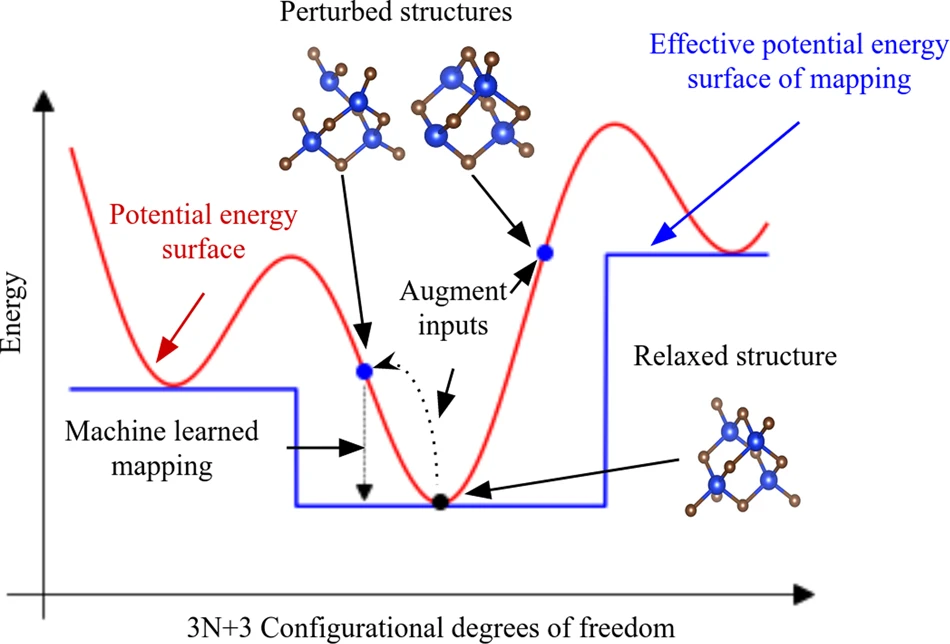 Data-augmentation for graph neural network learning of the relaxed energies of unrelaxed structures.
Data-augmentation for graph neural network learning of the relaxed energies of unrelaxed structures.
J. Gibson, A. C. Hire, and R. G. Hennig, npj Computational Materials 8, 2115 (2022), [doi:10.1038/s41524-022-00891-8].- Giant Stokes shift for charged vacancies in monolayer SnS.
A. M. Z. Tan, M. A. Garcia, and R. G. Hennig, Phys. Rev. Materials 6, 044003 (2022), [doi:10.1103/PhysRevMaterials.6.044003]. - Physically and chemically smooth cesium-antimonide photocathodes on single crystal strontium titanate substrates.
P. Saha, O. Chubenko, G. S. Gevorkyan, A. Kachwala, C. J. Knill, C. Sarabia-Cardenas, E. Montgomery, S. Poddar, J. T. Paul, R. G. Hennig, H. A. Padmore, and S. Karkare, Appl. Phys. Lett. 120, 194102 (2022), [doi:10.1063/5.0088306]. - Increasing the composition range of a novel τ11 Al4Fe1.7Si alloy with additions of Mn.
S. Soto-Medina, B. Rijal, A. K. Sachdev, R. G Hennig, and M. V. Manuel, Intermetallics 145, 107499 (2022), [doi:10.1016/j.intermet.2022.107499]. - Ligand optimization of exchange interaction in Co(II) dimer single-molecule magnet by machine learning.
S. Ren, E. Fonseca, W. Perry, H.-P. Cheng, X.-G. Zhang, and R. G. Hennig, J. Phys. Chem. A 126, 529 (2022), [doi:10.1021/acs.jpca.1c08950]. 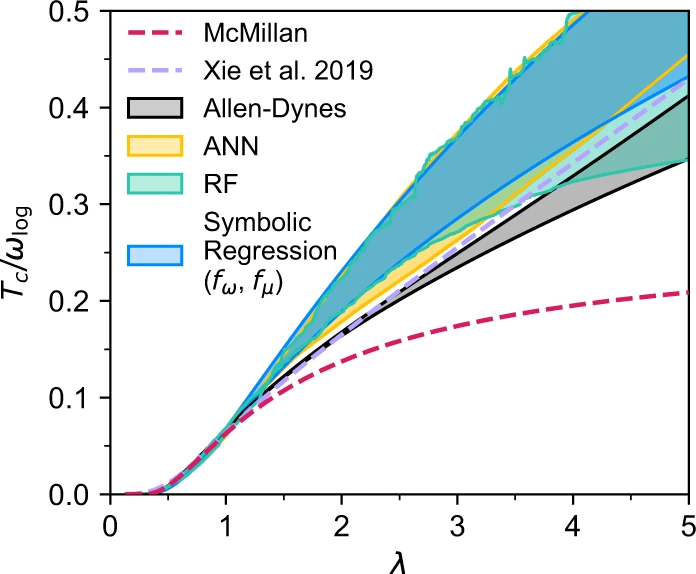 Machine learning of superconducting critical temperature from Eliashberg theory.
Machine learning of superconducting critical temperature from Eliashberg theory.
S. R. Xie, Y. Quan, A. C. Hire, B. Deng, J. M. DeStefano, I. Salinas, U. S. Shah, L. Fanfarillo, J. Lim, J. Kim, G. R. Stewart, J. J. Hamlin, P. J. Hirschfeld, and R. G. Hennig, npj Computational Materials 8, 1 (2022), [doi:10.1038/s41524-021-00666-7].- Limitations of empirical supercell extrapolation for calculations of point defects in bulk, at surfaces, and in two-dimensional materials.
C. Freysoldt, J. Neugebauer, A. M. Z. Tan, and R. G. Hennig, Phys. Rev. B 105, 014103 (2022), [doi:10.1103/PhysRevB.105.014103]. - Photoluminescence Induced by Substitutional Nitrogen in Single-Layer Tungsten Disulfide.
Q. Qian, W. Wu, L. Peng, Y. Wang, A. M. Z. Tan, L. Liang, S. M. Hus, K. Wang, T. H. Choudhury, J. M. Redwing, A. A. Puretzky, D. B. Geohegan, R. G. Hennig, X. Ma, S. Huang, ACS Nano 16, 7428 (2022), [doi:10.1021/acsnano.1c09809]. - Barriers to predictive high-throughput screening for spin-crossover.
D. Mejía-Rodríguez, A. Albavera-Mata, E. Fonseca, D.-T. Chen, H-P. Cheng, R. G. Hennig, and S.B. Trickey, Comput. Mater. Sci., 206, 111161 (2022), [doi:10.1016/j.commatsci.2021.111161]. - Crystal structure of the τ11 Al4Fe1.7Si phase from neutron diffraction and ab initio calculations.
B. Rijal, S. Soto, K. Parui, A. Sachdev, M. M.Butala, M. V. Manuel, and R. G. Hennig, J. Alloys Compd. 902, 163141 (2022), [doi:10.1016/j.jallcom.2021.163141]. - The 2021 Room-Temperature Superconductivity Roadmap.
L. Boeri, R. G. Hennig, P. J. Hirschfeld, G. Profeta, A. Sanna, E. Zurek, W. E. Pickett, M. Amsler, R. Dias, M. I. Eremets, C. Heil, R. J. Hemley, H. Liu, Y. Ma, C. Pierloni, A. N. Kolmogorov, N. Rybin, D. Novoselov, V. Anisimov, A. R. Oganov, C. J. Pickard, T. Bi, R. Arita, I. Errea, C. Pellegrini, R. Requist, E. K. U. Gross, E. R. Margine, S. R. Xie, Y. Quan, A. Hire, L. Fanfarillo, G. R. Stewart, J. J. Hamlin, V. Stanev, R. S. Gonnelli, E. Piatti, D. Romanin, D. Daghero, and R. Valenti, J. Condens. Matter Phys. 34, 183002 (2022), [doi:10.1088/1361-648X/ac2864]. - Charged vacancy defects in monolayer phosphorene.
B. Rijal, A. M. Z. Tan, C. Freysoldt, R. G. Hennig, Phys. Rev. M 5, 124004 (2021), [doi:10.1103/PhysRevMaterials.5.124004]. 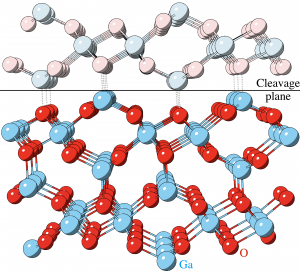 Computational synthesis of substrates by crystal cleavage.
Computational synthesis of substrates by crystal cleavage.
J. T. Paul, A. Galdi, C. Parzyck, K. M. Shen, J. Maxson, and R. G. Hennig, npj Computational Materials 7, 147 (2021),[doi:10.1038/s41524-021-00608-3].- First-principles study of superconductivity in alpha and beta Gallium.
Y. Quan, P. J. Hirschfeld, and R. G. Hennig, Phys. Rev. B 104, 075117 (2021), [doi:10.1103/PhysRevB.104.075117]. - High-pressure study of the low-Z rich superconductor Be22Re.
J. Lim, A. C. Hire, Y. Quan, J. Kim, L. Fanfarillo, S. R. Xie, R. S. Kumar, R. J. Hemley, Y. K. Vohra, R. G. Hennig, P. J. Hirschfeld, G. R. Stewart, and J. J. Hamlin, Phys. Rev. B 104, 064505 (2021), [doi:10.1103/PhysRevB.104.064505]. - Controllable p-Type Doping of 2D WSe2 via Vanadium Substitution.
A. Kozhakhmetov, S. Stolz, A. M. Z. Tan, R. Pendurthi, S. Bachu, F. Turker, N. Alem, J. Kachian, S. Das, R. G. Hennig, O. Gröning, B. Schuler, J. A. Robinson, Adv. Funct. Mater. 31, 2105252 (2021), [doi:10.1002/adfm.202105252]. 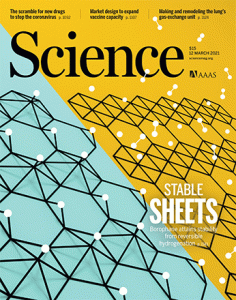 Synthesis of borophane polymorphs through hydrogenation of borophene.
Synthesis of borophane polymorphs through hydrogenation of borophene.
Q. Li, V. S. C. Kolluru, M. S. Rahn, E. Schwenker, S. Li, R. G. Hennig, P. Darancet, M. K. Y. Chan, M. C. Hersam, Science 371, 1143 (2021), (cover image) [doi:10.1126/science.abg1874].- A15 Nb3Si: A “high” Tc superconductor synthesized at a pressure of one megabar and metastable at ambient conditions.
J. Lim, J. S. Kim, A. Hire, Y. Quan, R. G. Hennig, P. J Hirschfeld, J. J. Hamlin, G. R. Stewart, and B. Olinger,
J. Phys.: Condens. Matter 33, 285705 (2021), [doi:10.1088/1361-648X/abeace]. - First-principles investigation of charged dopants and dopant-vacancy defect complexes in monolayer MoS2.
A. M. Z. Tan, C. Freysoldt, and R. G. Hennig
Phys. Rev. Materials 4, 114002 (2020), [doi:10.1103/PhysRevMaterials.4.114002]. - Scalable Substitutional Re-doping and its Impact on Optical and Electronic Properties of Tungsten Diselenide.
A. Kozhakhmetov, B. Schuler, A. M. Z. Tan, K. A. Cochrane, J. R. Nasr, H. El-Sherif, A. Bansal, A. Vera, V. Bojan, J. M. Redwing, N. l. Bassim, S. Das, R. G. Hennig, A. Weber-Bargioni, J. A. Robinson
Adv. Mater. 32, 2005159 (2020), [doi:10.1002/adma.202005159]. - Remarkable low-energy properties of the pseudogapped semimetal Be5Pt.
Laura Fanfarillo, J. J. Hamlin, R. G. Hennig, A. C. Hire, P. J. Hirschfeld, J. Kim, J. Lim, Y. Quan, G. R. Stewart, and S. R. Xie
Phys. Rev. B 102, 155206 (2020), [doi:10.1103/PhysRevB.102.155206]. - Split-vacancy defect complexes of oxygen and vacancies in hcp and fcc cobalt.
S. Honrao, R. Maaß, D. R. Trinkle, and R. G. Hennig
Phys. Rev. Materials 4, 103608 (2020), [doi:10.1103/PhysRevMaterials.4.103608]. - Augmenting Machine Learning of Energy Landscapes with Local Structural Information.
S. Honrao, S. R. Xie, and R. G. Hennig
J. Appl. Phys. 128, 085101 (2020) – Editors Pick, [doi:10.1063/5.0012407]. - Strain modulation using defects in two-dimensional MoS2
K. Burns, A. M. Z. Tan, H. Gordon, T. Wang, A. Gabriel, L. Shao, R. G. Hennig, and A. Aitkaliyeva
Phys. Rev. B 102, 085421 (2020), [doi:10.1103/PhysRevB.102.085421]. - Stability of charged sulfur vacancies in 2D and bulk MoS2 from plane-wave density functional theory with electrostatic corrections.
A. M. Z. Tan, C. Freysoldt, and R. G. Hennig,
Phys. Rev. Materials 4, 064004 (2020), [doi:10.1103/PhysRevMaterials.4.064004]. - Machine learning of octahedral tilting in oxide perovskites by symbolic classification with compressed sensing.
S. R. Xie, P. Kotlarz, R. G.Hennig, and J. C. Nino,
Comp. Mater. Sci. 180, 109690 (2020). [doi:10.1016/j.commatsci.2020.109690] - Role of magnetism on transition metal oxide surfaces in vacuum and solvent
V. S. C. Kolluru and R. G. Hennig,
Physical Review Materials 4, 045803 (2020). [doi:10.1103/PhysRevMaterials.4.045803] 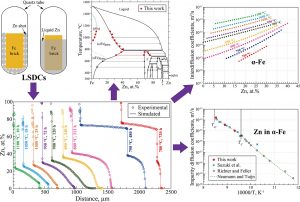 Phase equilibria and diffusion coefficients in the Fe-Zn binary system.
Phase equilibria and diffusion coefficients in the Fe-Zn binary system.
L. Zhu, S. Honrao, B. Rijal, R. G. Hennig, M. V. Manuel,
Materials & Design 188, 108437 (2020). [doi:10.1016/j.matdes.2019.10843]- Controlling neutral and charged excitons in MoS2 with defects.
K. Burns, Kory; A. M. Tan, A. Gabriel, L. Shao, R. G. Hennig, and A. Aitkaliyeva,
J. Mater. Res. 35, 949 (2020). [doi:10.1557/jmr.2019.404] - New Experimental Studies on the Phase Diagram of the Al-Cu-Fe Quasicrystal-Forming System.
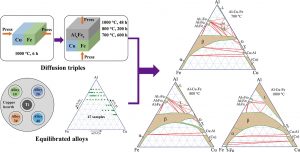 L. Zhu, S. Soto-Medina, W. Cuadrado-Castillo, R. G. Hennig, and M. V. Manuel,
L. Zhu, S. Soto-Medina, W. Cuadrado-Castillo, R. G. Hennig, and M. V. Manuel,
Materials and Design 185, 108186 (2020). [doi:10.1016/j.matdes.2019.108186] - Implicit self-consistent electrolyte model in plane-wave density-functional theory.
K. Mathew, V. S. C. Kolluru, S. Mula, S. N. Steinmann, and R. G. Hennig,
J. Chem. Phys. 151, 234101 (2019) – Editors Pick. [doi:10.1063/1.5132354]. - The Conundrum of Relaxation Volumes in First-Principles Calculations of Charged Defects in UO2.
A. Goyal, K. Mathew, R. G. Hennig, A. Chernatynskiy, C. R. Stanek, S. T. Murphy, D. A. Andersson, S. R. Phillpot, and B. P. Uberuaga,
Appl. Sci. 9, 5276 (2019). [doi:10.3390/app9245276]. - Experimental Investigation of the Al-Co-Fe Phase Diagram Over the Whole Composition Range.
L. Zhu, S. Soto-Medina, R. G. Hennig, and M. V. Manuel,
J. Alloy. Compd. 815, 152110 (2019). [doi:10.1016/j.jallcom.2019.152110] - Functional Form of the Superconducting Critical Temperature from Machine Learning.
S. R. Xie, G. R. Stewart, J. J. Hamlin, P. J. Hirschfeld, and R. G. Hennig,
Phys. Rev. B 100, 174513 (2019). [doi:10.1103/PhysRevB.100.174513] - Multi-Objective Optimization of Interatomic Potentials with Application to MgO.
E. J. Ragasa, C. J. O’Brien, R. G. Hennig, S. M. Foiles, and S. R. Phillpot,
Model. Simul. Mater. Sci. Eng. 27, 074007 (2019). [doi:10.1088/1361-651X/ab28d9] 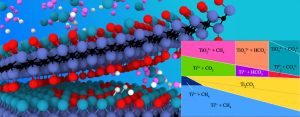 Predicting the Electrochemical Synthesis of 2D Materials from First-Principles.
Predicting the Electrochemical Synthesis of 2D Materials from First-Principles.
M. Ashton, N. Trometer, K. Mathew, J. Suntivich, C. Freysoldt, S. B. Sinnott, and R. G. Hennig,
J. Phys, Chem. C 123, 3180 (2019). [doi:10.1021/acs.jpcc.8b10802]- Nanocrystal symmetry breaking and accelerated solid-state diffusion in the lead-cadmium sulfide cation exchange system.
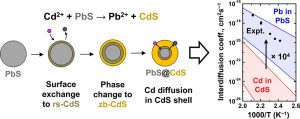 A. Nelson, S. Honrao, R. G. Hennig, and R. D. Robinson,
A. Nelson, S. Honrao, R. G. Hennig, and R. D. Robinson,
Chem. Mater. 31, 991 (2019). [doi:10.1021/acs.chemmater.8b04490] - Machine learning of ab-initio energy landscapes for crystal structure predictions.
S. Honrao, B. E. Anthonio, R. Ramanathan, J. J. Gabriel, and R. G. Hennig
Comp. Mater. Sci. 158, 414 (2019). [doi:10.1016/j.commatsci.2018.08.041] - Candidate Replacements for Lead in CH3NH3PbI3 from First Principles Calculations.
J. J. Gabriel, S. Xie, K. Choudhary, M. Sexton, S. R. Phillpot, J. Xue, and R. G. Hennig
Comp. Mater. Sci. 155, 69 (2018). [doi:j.commatsci.2018.08.015] 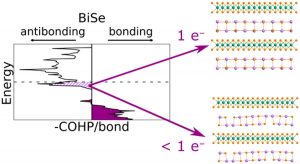 Insights into the Charge Transfer Stabilization of Heterostructure Components with Unstable Bulk Analogs.
Insights into the Charge Transfer Stabilization of Heterostructure Components with Unstable Bulk Analogs.
M. Esters, R. G. Hennig, and D. C. Johnson
Chem. Mater. 30, 4738 (2018). [doi:10.1103/10.1021/acs.chemmater.8b01594]- High-Throughput Density Functional Calculations to Optimize Properties and Interfacial Chemistry of Piezoelectric Materials.
J. A. Barr, F.-Y. Lin, M. Ashton, R. G. Hennig, and S. B. Sinnott
Phys. Rev. Materials 2, 025002 (2018). [doi:10.1103/PhysRevMaterials.2.025002] - Dynamic instabilities in strongly correlated VSe2 monolayers and bilayers.
M. Esters, R. G. Hennig, and D. C. Johnson
Phys. Rev. B 96, 235147 (2017). [doi:10.1103/PhysRevB.96.235147] - Computational Methods for 2D Materials: Discovery, Property Characterization, and Application Design.
J. T. Paul, A. K. Singh, Z. Dong, H. L. Zhuang, B. C. Revard, B. Rijal, M. Ashton, A. Linscheid, M. Blonsky, D. Gluhovic, J. Guo, and R. G. Hennig
J. Phys.: Condens. Matter 29, 473001 (2017). [doi:10.1088/1361-648X/aa9305] - Doping-controlled phase transitions in single-layer MoS2.
H. L. Zhuang, M. D. Johannes, A. K. Singh, and R. G. Hennig
Phys. Rev. B 96, 165305 (2017). [doi:10.1103/PhysRevB.96.165305] 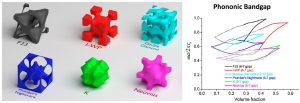 Exploring Periodic Bicontinuous Cubic Network Structures with Complete Phononic Bandgaps.
Exploring Periodic Bicontinuous Cubic Network Structures with Complete Phononic Bandgaps.
K. Hur, R. G. Hennig, and U. Wiesner
J. Phys. Chem. C 121, 22347 (2017). [doi:10.1021/acs.jpcc.7b07267]- Computational Study of Low Interlayer Friction in Tin+1Cn (n=1, 2 and 3) MXene.
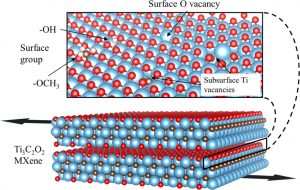 D. Zhang, M. Ashton, A. Ostadhossein, A. C. T. van Duin, R. G. Hennig, and S. B. Sinnott
D. Zhang, M. Ashton, A. Ostadhossein, A. C. T. van Duin, R. G. Hennig, and S. B. Sinnott
ACS Appl. Mater. Interfaces 9, 34467 (2017). [doi:10.1021/acsami.7b09895] - Interface-Driven Structural Distortions and Composition Segregation in 2D Heterostructures.
J. Ditto, D. R. Merrill, G. Mitchson, J. J. Gabriel, K. Mathew, R. G. Hennig, D. C. Johnson, D. L. Medlin, and N. D. Browning
Angew. Chem. Int. Ed. 56, 14448 (2017). [doi:10.1002/anie.201707270] - Two-Dimensional Half-Metals With Large Spin Gaps.
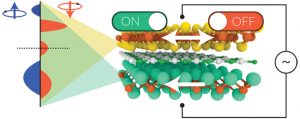 M. Ashton, D. Gluhovic, S. B. Sinnott, J. Guo, D. A. Stewart, and R. G. Hennig
M. Ashton, D. Gluhovic, S. B. Sinnott, J. Guo, D. A. Stewart, and R. G. Hennig
Nano Lett. 17, 5251 (2017). [doi:10.1021/acs.nanolett.7b01367] - Genetic Algorithm Prediction of Two-Dimensional Group-IV Dioxides for Dielectrics.
A. K. Singh, B. C. Revard, R. Ramanathan, M. Ashton, F. Tavazza, and R. G. Hennig
Phys. Rev. B 95, 155426 (2017), highlighted in Physics. [doi:10.1103/PhysRevB.95.155426] - Topology-Scaling Identification of Layered Solids and Stable Exfoliated 2D Materials.
M. Ashton, J. Paul, S. B. Sinnott, and R. G. Hennig
Phys. Rev. Lett. 118, 106101 (2017). [doi:10.1103/PhysRevLett.118.106101] - Evaluation and Comparison of Classical Interatomic Potentials Through a User-Friendly Interactive Web-Interface.
K. Choudhary, F. Y. P. Congo, T. Liang, C. Becker, R. G. Hennig, and F. Tavazza
Scientific Data 4, 160125 (2017). [doi:10.1038/sdata.2016.125] - Pressure-Induced Superconductivity in the Giant Rashba System BiTeI.
D. VanGennep, A. Linscheid, D. Jackson, S. Weir, Y. Vohra, H. Berger, G. Stewart, R. G. Hennig, P. Hirschfeld, and J. Hamlin
J. Phys. Condens. Matter 29, 09LT02 (2016). [doi:10.1088/1361-648X/aa5567] - Computational Discovery and Characterization of Polymorphic Two-Dimensional IV-V Materials.
M. Ashton, S. B. Sinnott, and R. G. Hennig
Appl. Phys. Lett. 109, 192103 (2016). [doi:10.1063/1.4967433] 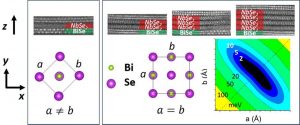 Structural Changes in 2D BiSe Bilayers as n Increases in (BiSe)1+δ(NbSe2)n (n = 1–4) Heterostructures.
Structural Changes in 2D BiSe Bilayers as n Increases in (BiSe)1+δ(NbSe2)n (n = 1–4) Heterostructures.
G. Mitchson, E. Hadland, F. Göhler, M. Wanke, M. Esters, J. Ditto, E. Bigwood, K. Ta, R. G. Hennig, T. Seyller, and D. C. Johnson
ACS Nano 10, 9489 (2016). [doi:10.1021/acsnano.6b04606]- Computational Discovery of Stable M2AX Phases.
M. Ashton, S. R. Broderick, K. Rajan, R. G. Hennig, and S. B. Sinnott
Phys. Rev. B 94, 054116 (2016). [doi:10.1103/PhysRevB.94.054116] - Role of Composition and Structure on the Properties of Metal/Multifunctional Ceramic Interfaces.
F.-Y. Lin, A. Chernatynskiy, J. C. Nino, J. L. Jones, R. G. Hennig, and S. B. Sinnott
J. Appl. Phys. 120, 045310 (2016). [doi:10.1063/1.4959074] - MPInterfaces: A Materials Project based Python Tool for High-Throughput Computational Screening of Interfacial systems.
K. Mathew, A. K. Singh, J. J. Gabriel, K. Choudhary, S. B. Sinnott, A. V. Davydov, F. Tavazza, R. G. Hennig
Comp. Mater. Sci. 122, 183 (2016). [doi:10.1016/j.commatsci.2016.05.020] - Properties of Ti/TiC Interfaces from Molecular Dynamics Simulations.
T. Liang, M. Ashton, K. Choudhary, D. Zhang, A. Fonseca, B. C. Revard, R. G. Hennig, S. R. Phillpot, and S. B. Sinnott
J. Phys. Chem. C 20, 12530 (2016). [doi:10.1021/acs.jpcc.6b02763] - Strong Anisotropy and Magnetostriction in 2D Stoner Ferromagnet Fe3GeTe2.
H. L. Zhuang, P. R. C. Kent, R. G. Hennig
Phys. Rev. B 93, 134407 (2016). [doi:10.1103/PhysRevB.93.134407] - Grand Canonical Evolutionary Algorithm for the Prediction of Two-Dimensional Materials.
B. C. Revard, W. W. Tipton, A. Yesypenko, and R. G. Hennig
Phys. Rev. B 93, 054117 (2016). [doi:10.1103/PhysRevB.93.054117] - Predicted Surface Composition and Thermodynamic Stability of MXenes in Solution.
M. Ashton, K. Mathew, R. G. Hennig, and S. B. Sinnott
J. Phys. Chem. C 120, 3550 (2016). [doi:10.1021/acs.jpcc.5b11887] - Stability and magnetism of strongly correlated single-layer VS2.
H. L. Zhuang and R. G. Hennig
Phys. Rev. B 93, 054429 (2016). [doi:10.1103/PhysRevB.93.054429] - Increased activity in hydrogen evolution electrocatalysis for partial anionic substitution in cobalt oxysulfide nanoparticles.
A. Nelson, K. E. Fritz, S. Honrao, R. G. Hennig, R. D. Robinson, and J. Suntivich
J. Mater. Chem. A 4, 2842 (2016). [doi:10.1039/C5TA08706F] - Computational characterization of lightweight multilayer MXene Li-ion battery anodes.
M. Ashton, R. G. Hennig, and S. B. Sinnott
Appl. Phys. Lett. 108, 023901 (2016). [doi:10.1063/1.4939745] - Dynamical properties of AlN nanostructures and heterogeneous interfaces predicted using COMB potentials.
K. Choudhary, T. Liang, K. Mathew, B. Revard, A. Chernatynskiy, S. R. Phillpot, R. G. Hennig, S. B. Sinnott
Comp. Mater. Sci. 113, 80 (2016). [doi:10.1016/j.commatsci.2015.11.025] - Enhanced Li-S Batteries Using Amine-Functionalized Carbon Nanotubes in the Cathode.
L. Ma, H. L. Zhuang, S. Wei, K. E. Hendrickson, M. S. Kim, G. Cohn, R. G. Hennig, and L. A. Archer
ACS Nano 10, 1050 (2016). [doi:10.1021/acsnano.5b06373] - High-throughput screening of substrates for synthesis and functionalization of 2D materials.
A. K. Singh, K. Mathew, A. V. Davydov, R. G. Hennig, and F. Tavazza
Proc. SPIE 9553, 955316 (2015). [doi:10.1117/12.2192866] - Hybrid Cathode Architectures for Lithium Batteries based on TiS2 and Sulfur.
L. Ma, S. Wei, H. L. Zhuang, K. Hendrickson, R. G. Hennig, and L. A. Archer
J. Mater. Chem. A 3, 19857 (2015). [doi:10.1039/C5TA06348E] - Ab-initio Prediction of Piezoelectricity in Two-Dimensional Materials.
M. N. Blonsky, H. L. Zhuang, A. K. Singh, and R. G. Hennig
ACS Nano 9, 9885 (2015). [doi:10.1021/acsnano.5b03394] - Rashba effect in single-layer antimony telluroiodide SbTeI.
H. L. Zhuang, V. R. Cooper, H. Xu, P. Ganesh, R. G. Hennig, and P. R. C. Kent
Phys. Rev. B 92, 115302 (2015). [doi:10.1103/PhysRevB.92.115302] - Computational Discovery of Lanthanide Doped and Co-doped Y3Al5O12 for Optoelectronic Applications.
K. Choudhary, A. Chernatynskiy, K. Mathew, E. W. Bucholz, S. R. Phillpot, S. B. Sinnott, and R. G. Hennig
Appl. Phys. Lett. 107, 112109 (2015). [doi:10.1063/1.4929434] - Al2O3 as a suitable substrate and a dielectric layer for n-layer MoS2.
A. K. Singh, R. G. Hennig, A. V. Davydov, and F. Tavazza
Appl. Phys. Lett. 107, 053106 (2015). [doi:10.1063/1.4928179] - Density functional theory study of the electrochemical interface between a Pt electrode and an aqueous electrolyte using an implicit solvent method.
S. Sakong, M. Naderian, K. Mathew, R. G. Hennig, and A. Gross
J. Chem. Phys. 142, 234107 (2015). [doi:10.1063/1.4922615] 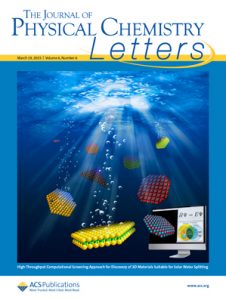 Computational Screening of 2D Materials for Photocatalysis.
Computational Screening of 2D Materials for Photocatalysis.
A. K. Singh, K. Mathew, H. L. Zhuang, and R. G. Hennig
J. Phys. Chem. Lett. 6, 1087 (2015), Invited Perspective featured as Cover Image (click here). [doi:10.1021/jz502646d]- Strong Spin-Lattice Coupling in CrSiTe3.
L. Casto, A. Clune, M. Yokosuk, J. Musfeldt, T. Williams, H. L. Zhuang, M. W. Lin, K. Xiao, R. G. Hennig, B. Sales, J. Yan, and D. Mandrus.
APL Materials 3, 041515 (2015). [doi:10.1063/1.4914134]. - Comparison of polynomial approximations to speed up planewave-based quantum Monte Carlo calculations.
W. D. Parker, C. J. Umrigar, D. Alfe, F. R. Petruzielo, R. G. Hennig, J. W. Wilkins
J. Comp. Phys. 287, 77 (2015). [doi:10.1016/j.jcp.2015.01.037] - Ab-initio studies of Cs on GaAs (100) and (110) surfaces.
S. Karkare, L. Boulet, A. Singh, R. G. Hennig, and I. Bazarov.
Phys. Rev. B 91, 035408 (2015). [doi:10.1103/PhysRevB.91.035408] - ReaxFF Molecular Dynamics Simulations on Lithiated Sulfur Cathode Materials.
A. Ostadhossein, O. Borodin, A. T. Yeates, W. W. Tipton, R. G. Hennig, M. D. Mahbubul Islam, and A. van Duin.
Phys. Chem. Chem. Phys. 17, 3383 (2015). [10.1039/C4CP04532G] - Solid-Solid Phase Transformations Induced through Cation Exchange and Strain, in 2D Heterostructured Copper Sulfide Nanocrystals.
D.H. Ha, A. H. Caldwell, M. J. Ward, S. Honrao, K. Mathew, R. Hovden, M. K. A. Koker, D. A. Muller, R. G. Hennig, and R. D. Robinson.
Nano Lett. 14, 7090 (2014). [doi:10.1021/nl5035607] - The Nanocrystal Superlattice Pressure Cell: A Novel Approach To Study Molecular Bundles under Uniaxial Compression.
K. Bian, A. Singh, R. G. Hennig, Z. Wang, and T. Hanrath.
Nano Lett. 14, 4763 (2014). [doi:10.1021/nl501905a] - Importance of high angular momentum channels in pseudopotentials for quantum Monte Carlo.
W. W. Tipton, N. D. Drummond, and R. G. Hennig.
Phys. Rev. B 90, 125110 (2014). [doi:10.1103/PhysRevB.90.125110] - Computational Synthesis of Single-Layer GaN on Refractory Materials.
A. K. Singh and R. G. Hennig.
Appl. Phys. Lett. 105, 051604 (2014). [doi:10.1063/1.4892351] - Computational prediction of two-dimensional group-IV mono-chalcogenides.
A. K. Singh and R. G. Hennig.
Appl. Phys. Lett. 105, 042103 (2014). [doi:10.1063/1.4891230] - Tethered Molecular Sorbents: Enabling Metal-Sulfur Battery Cathodes.
L. Ma, H. L. Zhuang, Y. Lu, S. Moganty, R. G. Hennig, L. Archer.
Advanced Energy Materials 4, 1400390 (2014). [doi:10.1002/aenm.201400390] - Ab-Initio Synthesis of Single-Layer III-V Materials.
A. K. Singh, H. L. Zhuang, and R. G. Hennig.
Phys. Rev. B 89, 245432 (2014). [doi:10.1103/PhysRevB.89.245431] - Ab-initio prediction of the Li5Ge2 Zintl compound.
W. W. Tipton, C. A. Mathulis, and R. G. Hennig.
Comp. Mater. Sci. 93, 133 (2014). [doi:10.1016/j.commatsci.2014.06.014] - Nanoparticle Metamorphosis: An In-Situ High-Temperature Transmission Electron Microscopy Study of the Structural Evolution of Heterogeneous Au:Fe2O3 Nanoparticles.
W. J. Baumgardner, Y. Yu ,R. Hovden, S. Honrao, R. G Hennig, H. D. Abruña, D. Muller, and T. Hanrath.
ACS Nano 8, 5315 (2014). [doi:10.1021/nn501543d] - Theoretical Studies of Carbonyl Based Organic Molecules for Energy Storage Applications: The Heteroatom and Substituent Effect.
K. Hernandez-Burgos, S. Burkhardt, G. Rodríguez-Calero, R. G. Hennig, H. D. Abruña.
J. Phys. Chem. C 118, 6046 (2014). [doi:10.1021/jp4117613] - Implicit solvation model for density-functional study of nanocrystal surfaces and reaction pathways.
K. Mathew, R. Sundararaman, K. Letchworth-Weaver, T. A. Arias, and R. G. Hennig.
J. Chem. Phys. 140, 084106 (2014). [doi:10.1063/1.4865107] - Structure and Stability Prediction of Compounds with Evolutionary Algorithms.
B. C. Revard, W. W. Tipton, and R. G. Hennig.
Topics in Current Chemistry 345, 181 (2014). [doi:10.1007/128_2013_489] - Computational Discovery, Characterization, and Design of Single-Layer Materials.
H. L. Zhuang and R. G. Hennig.
Journal of Metals 66, 366 (2014). [doi:10.1007/s11837-014-0885-3] - Computational Prediction and Characterization of Single-Layer CrS2 .
H. L. Zhuang, M. D. Johannes, M. N. Blonsky, and R. G. Hennig.
Appl. Phys. Lett. 104, 022116 (2014). [doi:10.1063/1.4861659] - Computational Discovery of Single-Layer CdO for Electronic and Optical Applications.
H. L. Zhuang and R. G. Hennig.
Appl. Phys. Lett. 103, 212102 (2013). [doi:10.1063/1.4831972] - A grand canonical genetic algorithm for the prediction of multi-component phase diagrams and testing of empirical potentials.
W. W. Tipton and R. G. Hennig.
J. Phys.: Cond. Matter 25, 495401 (2013). [doi:10.1088/0953-8984/25/49/495401] - Computational search for single-layer transition-metal dichalcogenide photocatalysts.
H. L. Zhuang and R. G. Hennig.
Journal of Physical Chemistry C 117, 20440 (2013). [doi:10.1021/jp405808a] - Theoretical perspective of photocatalytic properties of single-layer SnS2 .
H. L. Zhuang and R. G. Hennig.
Phys. Rev. B 88, 115314 (2013). [doi:10.1103/PhysRevB.88.115314] - Single-Layer Group-III Monochalcogenide Photocatalysts for Water Splitting.
H. L. Zhuang and R. G. Hennig.
Chemistry of Materials 25, 3232 (2013). [doi:10.1021/cm401661x] - Accuracy of Exchange-Correlation Functionals and Effect of Solvation on the Surface Energy of Copper.
M. Fishman, H. L. Zhuang, K. Mathew, W. Dirschka, and R. G. Hennig.
Phys. Rev. B 87, 245402 (2013). [doi:10.1103/PhysRevB.87.245402] - (NH4 )2 S, a Highly Reactive Molecular Precursor for Low Temperature Anion Exchange Reactions in Nanoparticles.
H. Zhang, L. V. Solomon, D.-H. Ha, S. Honrao, R. G. Hennig, and R. D. Robinson
Dalton Transactions 42, 12596 (2013). [doi:10.1039/C3DT50803J] - Structures, Phase Stabilities, and Electrical Potentials of Li-Si Battery Anode Materials.
W. W. Tipton, C. R. Bealing, K. Mathew, R. G. Hennig.
Phys. Rev. B 87, 184114 (2013). [doi:10.1103/PhysRevB.87.184114] - The Oxidation of Cobalt Nanoparticles into Kirkendall-Hollowed CoO and Co3 O4 : The Diffusion Mechanisms and Atomic Structural Transformations.
D.-H. Ha, L. M. Moreau, S. Honrao, R. G. Hennig, and R. D. Robinson.
J. Phys. Chem. C 117, 14303 (2013). [doi:10.1021/jp402939e] - Computational Discovery of Single-Layer III-V Materials.
H. L. Zhuang, A. K. Singh, and R. G. Hennig.
Phys. Rev. B 87, 165415 (2013). [doi:10.1103/PhysRevB.87.165415] - Scaling Relation for Thermal Ripples in Single and Multilayer Graphene.
A. K. Singh and R. G. Hennig.
Phys. Rev. B 87, 094112 (2013). [doi:10.1103/PhysRevB.87.094112] - Van der Waals Epitaxial Growth of Graphene on Sapphire by CVD without a Metal Catalyst.
J. Hwang, D. Campbell, S. Shivaraman, H. Alsalman, J. Y. Kwak, M. Kim, A. R. Woll, A. Singh, R. G. Hennig, S. Gorantla, M. H. Rümmeli, and M. G. Spencer.
ACS Nano 7, 385 (2013). [doi:10.1021/nn305486x] - Li-Carboxylate Anode Structure-Property Relationships from Molecular Modeling.
S. E. Burkhardt, J. Bois, J.-M.Tarascon, R. G. Hennig, and H. D. Abruna.
Chemistry of Materials 25, 132 (2013). [doi:10.1021/cm302839z] - Electronic Structures of Single-Layer Boron Pnictides.
H. L. Zhuang and R. G. Hennig.
Appl. Phys. Lett. 101, 153109 (2012). [doi:10.1063/1.4758465] - High throughput thin film Pt-M alloys for fuel electrooxidation – Low concentrations of M (M = Sn, Ta, W, Mo, Ru, Fe, In, Pd, Hf, Zn, Zr, Nb, Sc, Ni, Ti, V, Cr, Rh).
M. Tague, J. Gregoire, A. Legard, E. Smith, D. Dale, R. G. Hennig, F. DiSalvo, R. Bruce Van Dover, and H. Abruna.
J. Electrochem. Soc. 159, F880 (2012). [doi:10.1149/2.003301jes] - Following Chemical Charge Trapping in Pentacene Thin Films by Selective Impurity Doping and Wavelength-Resolved Electric Force Microscopy.
L. M. Smieska, V. A. Pozdin, J. L. Luria, R. G. Hennig, M. A. Hines, C. A. Lewis, J. A. Marohn.
Advanced Functional Materials 22, 5096 (2012). [doi:10.1002/adfm.201200595] - Unintended Phosphorus Doping of Nickel Nanoparticles during Synthesis with TOP: A Discovery through Structural Analysis.
L. M. Moreau, D.-H. Ha, C. R. Bealing, H. Zhang, R. G. Hennig, and R. D. Robinson.
Nano Lett. 12, 4530 (2012). [doi:10.1021/nl301642g] - Ab initio prediction of environmental embrittlement at a crack tip in aluminum.
R. J. Zamora, A. K. Nair, R. G. Hennig, and D. H. Warner.
Phys. Rev. B 86, 060101(R) (2012), Selected as Editor’s Suggestion and highlighted in Physics. [doi:10.1103/PhysRevB.86.060101] - Ab initio based empirical potential used to study the mechanical properties of molybdenum.
H. Park, M. R. Fellinger, T. J. Lenosky, W. W. Tipton, D. R. Trinkle, S. P. Rudin, C. Woodward, J. W. Wilkins, and R. G. Hennig.
Phys. Rev. B 85, 214121 (2012). [doi:10.1103/PhysRevB.85.214121] - A framework for solvation in quantum Monte Carlo.
K. A. Schwarz, R. Sundararaman, K. Letchworth-Weaver, T. A. Arias, and R. G. Hennig.
Phys. Rev. B 85, 201102(R) (2012), Selected as Editor’s Suggestion. [doi:10.1103/PhysRevB.85.201102] - Predicting Nanocrystal Shape Through Consideration of Surface-Ligand Interactions.
C. R. Bealing, W. J. Baumgardner, J. J. Choi, T. Hanrath, and R. G Hennig.
ACS Nano 6, 2118 (2012). [doi:10.1021/nn3000466] - Predicting Chiral Nanostructures, Lattices and Superlattices in Complex Multicomponent Nanoparticle Self-Assembly.
K. Hur, R. G. Hennig, F. A. Escobedo, and U. Wiesner.
Nano Lett. 12, 3218 (2012). [doi:10.1021/nl301209c] - Angle-Resolved Raman Imaging of Interlayer Rotations and Interactions in Twisted Bilayer Graphene.
R. W. Havener, H. Zhuang, L. Brown, R. G Hennig, and J. Park.
Nano Lett. 12, 3162 (2012). [doi:10.1021/nl301137k] - Synchrotron x-ray spectroscopy studies of valence and magnetic state in europium metal to extreme pressures.
W. Bi, N. M. Souza-Neto, D. Haskel, G. Fabbris, E. E. Alp, J. Zhao, R. G. Hennig, M. M. Abd-Elmeguid, Y. Meng, R. W. McCallum, K. Dennis, and J. S. Schilling.
Phys. Rev. B 85, 205134 (2012). [doi:10.1103/PhysRevB.85.205134] - Tailored Redox Functionality of Small Molecules for Pseudocapacitive Electrodes.
S. E. Burkhardt, M. A. Lowe, S. Conte, W. Zhou, H. Qian, G. G. Rodriguez-Calero, J. Gao, R. G. Hennig, H. D. Abruña.
Energy and Environmental Science 5, 7176 (2012). [doi:10.1039/C2EE21255B] - Accuracy of Quantum Monte Carlo Methods for Point Defects in Solids.
W. D. Parker, J. W. Wilkins, and R. G. Hennig.
In Advanced Calculations for Defects in Materials: Electronic Structure Methods (ed. A. Alkauskas, P. Deak, J. Neugebauer, A. Pasquarello and C. G. Van de Walle), Wiley-VCH, Weinheim, Germany (2011). [web] - Three-Dimensionally Isotropic Negative Refractive Index Materials from Block Copolymer Self-Assembled Chiral Gyroid Networks.
K. Hur, Y. Francescato, V. Giannini, S. A. Maier, R. G. Hennig, U. Wiesner.
Angewandte Chemie 50, 11985 (2011). [web] - Coupled Quantum-Continuum Analysis of Crack Tip Processes in Aluminum.
A. K. Nair, D. H. Warner, and R. G. Hennig.
J. Mech. Phys. Solids 59, 2476 (2011). [web] - Energy landscape of silicon tetra-interstitials using an optimized classical potential.
Y. A. Du, T. J. Lenosky, R. G. Hennig, S. Goedecker, and J. W. Wilkins.
Phys. Stat. Sol. B 248, 2050 (2011). [web] - Towards Organic Energy Storage: Characterization of 2,5-bis(methylthio)thieno[3,2-b]thiophene.
S. E. Burkhardt, S. Conte, G. G. Rodriguez-Calero, M. A. Lowe, H. Qian, W. Zhou, J. Gao, R. G. Hennig, Héctor D. Abruña.
J. Mat. Chem. 21, 9553 (2011). [web] - Computationally-Driven Experimental Discovery of the CeIr4 In Compound.
D. J. Fredeman, P. H. Tobash, M. A. Torrez, J. D. Thompson, E. D. Bauer, F. Ronning, W. Tipton, S. P. Rudin, and R. G. Hennig.
Phys. Rev. B 83, 224102 (2011). [web] - Softened Elastic Response and Unzipping in Chemical Vapor Deposition Graphene Membranes.
C. S. Ruiz-Vargas, H. L. Zhuang, P. Y. Huang, A. M. van der Zande, S. Garg, P. L. McEuen, D. A. Muller, R. G. Hennig, and J. Park.
Nano Lett. 11, 2259 (2011), [web]  The structural evolution and diffusion during the chemical transformation from cobalt to cobalt phosphide nanoparticles.
The structural evolution and diffusion during the chemical transformation from cobalt to cobalt phosphide nanoparticles.
D.-H. Ha, L. M. Moreau, C. R. Bealing, H. Zhang, R. G. Hennig, and R. D. Robinson.
J. Mater. Chem. 21, 11498 (2011). [web]
Highlighted as Hot Article and selected for Inside Cover .- Controlling nanocrystal superlattice symmetry and shape-anisotropic interactions through variable ligand surface coverage.
J. J. Choi, C. R. Bealing, K. Bian, K. J. Hughes, W. Zhang, D.-M. Smilgies, R. G. Hennig, James R. Engstrom, and Tobias Hanrath.
J. Am. Chem. Soc. 133, 3131 (2011). [web] - Pressure-induced structure transitions in Eu metal to 92 GPa.
W. Bi, Y. Meng, R. S. Kumar, A. L. Cornelius, W. W. Tipton, R. G. Hennig, Y. Zhang, C. Chen, and J. S. Schilling.
Phys. Rev. B 83, 104106 (2011). [web] - Spectroscopic Characterization of Charged Defects in Polycrystalline Pentacene by Time- and Wavelength-Resolved Electric Force Microscopy.
J. L. Luria, K. A. Schwarz, M. J. Jaquith, R. G. Hennig, and J. A. Marohn.
Advanced Materials 23, 624 (2011). [web] - Silver delafossite nitride, AgTaN2 ?
A. Miuraa, M. Lowe, B. M. Leonard, C. V. Subban, Y. Masubuchi, S. Kikkawa, R. Dronskowski, R. G. Hennig, H. D. Abruna and F. J. DiSalvo.
J. Solid State Chem. 184, 7 (2011). [web] 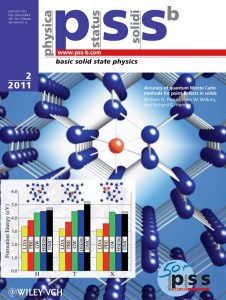 Accuracy of quantum Monte Carlo methods for point defects in solids.
Accuracy of quantum Monte Carlo methods for point defects in solids.
W. D. Parker, J. W. Wilkins, and R. G. Hennig.
Phys. Status Solidi B 248, 267 (2011). [web]- Mesoscopic structure prediction of nanoparticle assembly and coassembly: Theoretical foundation.
K. Hur, R. G. Hennig, F. A. Escobedo, and U. Wiesner.
J. Chem. Phys. 133, 194108 (2010). [web] - Random Search Methods.
W. W. Tipton and R. G. Hennig.
In Modern Methods of Crystal Structure Prediction (ed. A. R. Oganov), Wiley-VCH, Weinheim, Germany (2010). [web] - First Blind Test of Inorganic Crystal Structure Prediction Methods.
A. R. Oganov, J. C. Schon, M. Jansen, S. M. Woodley, W. W. Tipton, R. G. Hennig.
In Modern Methods of Crystal Structure Prediction (ed. A. R. Oganov), Wiley-VCH, Weinheim, Germany (2010). [web] - Phase Behavior of Pseudobinary Precious Metal−Carbide Systems.
J. M. Gregoire, M. E. Tague, E. H. Smith, D. Dale, F. J. DiSalvo, H. D. Abruna, R. G. Hennig, and R. Bruce van Dover.
J. Phys. Chem C 114, 21664 (2010). [web] - Theoretical and electrochemical analysis of poly(3,4-alkylenedioxythiophenes): Electron-donating effects and onset of p-doped conductivity.
S. E. Burkhardt, G. G. Rodriguez-Calero, M. A. Lowe, Y. Kiya, R. G. Hennig, and H. D. Abruna.
J. Phys. Chem C 114, 16776 (2010). [web] - Coupling quantum and continuum scales to predict crack tip dislocation nucleation.
A. K. Nair, D. H. Warner, R. G. Hennig, and W. A. Curtin.
Scripta Materialia 63, 1212 (2010). [web] - Phase transformation in Si from semiconducting diamond to metallic beta-Sn phase in QMC and DFT under hydrostatic and anisotropic stress.
R. G. Hennig, A. Wadehra, K. P. Driver, W. D. Parker, C. J. Umrigar, and J. W. Wilkins.
Phys. Rev. B 82, 014101 (2010). [web] - Energy landscape of silicon systems and its description by force fields, tight binding schemes, density functional methods, and quantum Monte Carlo methods.
S. Alireza Ghasemi, M. Amsler, R. G. Hennig, S. Roy, S. Goedecker, T. J. Lenosky, C. J. Umrigar, L. Genovese, T. Morishita, and K. Nishio.
Phys. Rev. B 81, 214107 (2010). [web] - Applying for computational time on NSF’s TeraGrid—the world’s largest cyberinfrastructure supporting open research.
K. Thornton, D. R. Trinkle, and R. G. Hennig.
JOM 62, 17 (2010). [web] - Classical potential describes martensitic phase transformations between the alpha, beta, and omega titanium phases.
R. G. Hennig, T. J. Lenosky, D. R. Trinkle, S. P. Rudin, and J. W. Wilkins.
Phys. Rev. B 78, 054121 (2008). [web] - Emergent reduction of electronic state dimensionality in dense ordered Li-Be alloys.
J. Feng, R. G. Hennig, N. W. Ashcroft and Roald Hoffmann.
Nature 451, 445 (2008). [web] - Quantum Monte Carlo algorithms for electronic structure at the petascale; the endstation project.
K. P. Esler, J. Kim, D. M. Ceperley, W. Purwanto, E. J. Walter, H. Krakauer, SW Zhang, P. R. C. Kent, R. G. Hennig, C. Umrigar, M. Bajdich, J. Kolorenc, L. Mitas, A. Srinivasan.
J. Phys.: Conf. Ser. 125, 012057 (2008). [web] - From compact point defects to extended structures in silicon.
Y. A. Du, R. G. Hennig, T. J. Lenosky and J. W. Wilkins.
Eur. Phys. J. B 57, 229 (2007). [web] - Alleviation of the Fermion-Sign Problem by Optimization of Many-Body Wave Functions.
C. J. Umrigar, J. Toulouse, C. Filippi, S. Sorella and R. G. Hennig.
Phys. Rev. Lett. 98, 110201 (2007). [web] - Questioning the existence of a unique ground-state structure for Si clusters.
W. Hellmann, R. G. Hennig, S. Goedecker, C. J. Umrigar, B. Delley and T. Lenosky.
Phys. Rev. B 75, 085411 (2007). [web] - Comparison of screened hybrid density functional theory to diffusion Monte Carlo in calculations of total energies of silicon phases and defects.
E. R. Batista, J. Heyd, R. G. Hennig, B. P. Uberuaga, R. L. Martin, G. E. Scuseria, C. J. Umrigar, and J. W. Wilkins.
Phys. Rev. B 74, 121102(R) (2006). [web] - Diffusion mechanisms for silicon di-interstitials.
Y. A. Du, R. G. Hennig, and J. W. Wilkins.
Phys. Rev. B 73, 245203 (2006). [web] - Location and energy of interstitial hydrogen in the 1/1 approximant W-TiZrNi of the icosahedral TiZrNi quasicrystal: Rietveld refinement of x-ray and neutron diffraction data and density-functional calculations.
R. G. Hennig, E. H. Majzoub and K. F. Kelton.
Phys. Rev. B 73, 184205 (2006). [web] - An empirical tight-binding model for titanium phase transformations.
D. R. Trinkle, M. D. Jones, R. G. Hennig, S. P. Rudin, R. C. Albers and J. W. Wilkins.
Phys. Rev. B, 73 094123 (2006). [web] - Hydrogen storage in Ti-Zr and Ti-Hf-based quasicrystals.
K. F. Kelton, J. J. Hartzell, R. G. Hennig, V. T. Huett and A. Takasaki.
Philosophical Magazine 86, 957 (2006). [web] - Impurities block the alpha to omega martensitic transformation in titanium.
R. G. Hennig, D. R. Trinkle, J. Bouchet, S. G. Srinivasan, R. C. Albers, and J. W. Wilkins.
Nature Materials 4, 129 (2005). [web] - Systematic pathway generation and sorting in martensitic transformations: Titanium alpha to omega.
D. R. Trinkle, D. M. Hatch, H. T. Stokes, R. G. Hennig and R. C. Albers.
Physical Review B 72, 014105 (2005). [web] - Fast diffusion mechanism of silicon tri-interstitial defects.
Y. A. Du, S. A. Barr, K. R. A. Hazzard, T. J. Lenosky, R. G. Hennig, and J. W. Wilkins.
Physical Review B Rapid Communications 72, 241306(R) (2005). [web] - Ab initio Ti-Zr-Ni phase diagram predicts stability of icosahedral TiZrNi quasicrystal.
R. G. Hennig, A. E. Carlsson, K. F. Kelton, and C. L. Henley.
Physical Review B 71, 144103 (2005). [web] - Hydrogen absorption in Ti-Zr-Ni quasicrystals and 1/1 approximants.
J. Y. Kim, R. Hennig, V. T. Huett, P. C. Gibbons, K. F. Kelton.
Journal of Alloys and Compounds 404, 388 (2005). [web] - Complexity of small silicon self-interstitial defects.
D. A. Richie, J. Kim, S. A. Barr, K. R. A. Hazzard, R. G. Hennig, and J. W. Wilkins.
Physical Review Letters 92, 045501 (2004). [web] - Ti-Zr-Ni and Ti-Hf-Ni quasicrystals and approximants as hydrogen storage alloys.
P. C. Gibbons, R. G. Hennig, V. T. Huett, K. F. Kelton.
Journal of Non-Crystalline Solids 334-335, 461 (2004). [web] - A new mechanism for the alpha to omega martensitic transformation in pure titanium.
D. R. Trinkle, R. G. Hennig, S. G. Srinivasan, D. M. Hatch, M. D. Jones, H. T. Stokes, R. C. Albers, and J. W. Wilkins.
Physical Review Letters 91, 025701 (2003). [web] - Structure of the icosahedral Ti-Zr-Ni quasicrystal.
R. G. Hennig, A. E. Carlsson, K. F. Kelton, and C. L. Henley.
Physical Review B 67, 134202 (2003). [web] - Rietveld refinement and ab initio calculations of a C14-like Laves phase in Ti-Zr-Ni.
E.H . Majzoub, R. G. Hennig, and K. F. Kelton.
Philosophical Magazine Letters 83, 65 (2003). [web] - Electronic structure of dangling bonds in amorphous silicon studied via a density-matrix functional method.
R.G. Hennig, P.A. Fedders, and A.E. Carlsson.
Physical Review B 66, 195213 (2002). [web] - Large-scale molecular dynamics simulations of interstitial defect diffusion in silicon.
D. A. Richie, J. Kim, R. G. Hennig, K. Hazzard, S. Barr, and J. W. Wilkins.
MRS Proceedings 731, W9.10 (2002). [web] - Theoretical and experimental investigation of the electronic structure of Ti-Zr-Ni and Ti-Zr-Ni:H alloys.
E. Belin-Ferre, R. G. Hennig, Z. Dankhazi, A. Sadoc, J. Y. Kim, K. F. Kelton.
Journal of Alloys and Compounds 342, 337 (2002). [web] - Ab-initio study of the ground-state phase diagram of the icosahedral Ti-Zr-Ni quasicrystal.
R. G. Hennig, K. F. Kelton, and C. L. Henley.
Computer simulation studies in condensed-matter physics XIV, 204 (2002). [web] - Density-matrix functional method for electronic properties of impurities.
R. G. Hennig and A. E. Carlsson.
Physical Review B 63, 115116 (2001). [web] - Fundamental cluster and hydrogen sites in Ti-Zr-Ni quasicrystals.
E. H. Majzoub, R. G. Hennig, K. F. Kelton, P. C. Gibbons, and S. T. Misture.
MRS Proceedings 643, K5.2.1 (2001). [web] - Structural modelling of the Ti-Zr-Ni quasicrystal.
R. G. Hennig, E. H. Majzoub, A. E. Carlsson, K. F. Kelton, C. L. Henley, W. B. Yelon, S. T. Misture.
Materials Science and Engineering A 294-296, 361 (2000). [web] - Cluster structure and hydrogen in Ti-Zr-Ni quasicrystals and approximants.
E. H. Majzoub, J. Y. Kim, R. G. Hennig, K. F. Kelton, P. C. Gibbons, W. B. Yelon.
Materials Science and Engineering A 294-296, 108 (2000). [web] - First-principles study on the stabilization of approximants to icosahedral titanium-3d-transition-metal quasicrystals by silicon and oxygen.
R. G. Hennig and H. Teichler.
Philosophical Magazine A 76, 1053 (1997). [web]